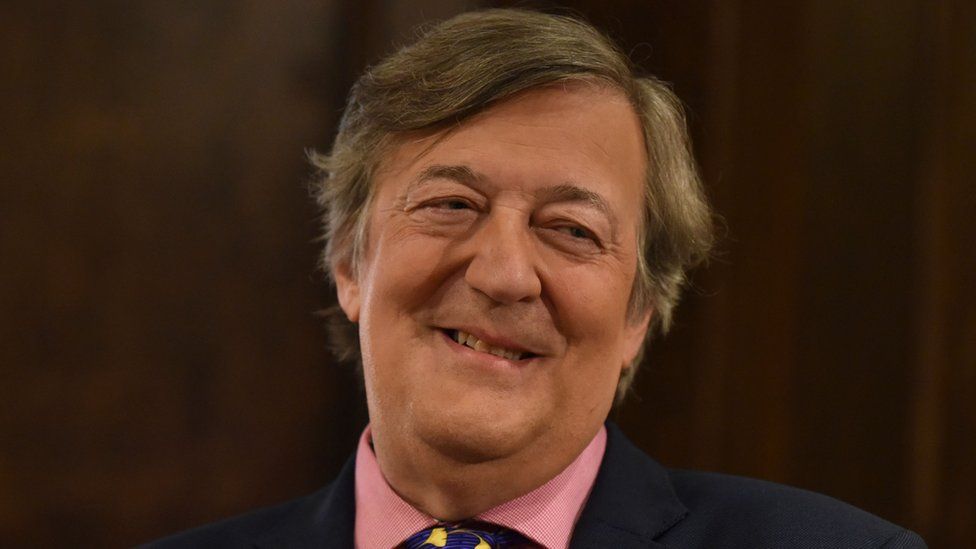Stephen Fry back at work three months after fall off stage
- Published

Stephen Fry says he needed constant physiotherapy after breaking his leg, pelvis and a "bunch of ribs"
Stephen Fry has said he finally feels comfortable returning to work - three months after having a nasty 6ft (1.8m) fall from a stage at London's O2 Arena.
The actor and broadcaster spoke about his recovery for the first time during an interview with Claudia Winkleman on her BBC Radio 2 show on Saturday.
He was left needing constant physiotherapy after breaking his leg, pelvis and a "bunch of ribs".
But he will soon be back on screens, hosting a UK version of Jeopardy!
Fry said he "praised my lucky stars" he did not injure his spine or skull after falling 6ft onto concrete while trying to exit the stage following a lecture about AI at the O2 Arena, in Greenwich, south-east London, in September.
"I did my bow after delivering this lecture, turned to go off stage and didn't realise that I was walking off the part of the stage where there was nothing - just a six-foot drop on to concrete," he said.
"So I broke my right leg in a couple of places and my hip and pelvis in four places and a bunch of ribs."
Speaking to Winkleman about his new ITV television show Jeopardy! - which is already a popular quiz show in the US - he said it had been "an exciting week" as he flew to Zurich for an event and did not need to use his walking stick for the first time since his fall.
The 66-year-old added he was now fine, as "like Lazarus I cast aside my crutches" and will return to work.
Winkleman said she had no idea his accident had happened, but Fry quickly responded that "I didn't want to make a fuss about it".
When asked what the secret was behind his recovery, he said "constant physiotherapy", although he was reluctant to take Oxycontin on his first night at hospital, as it is known for being a highly addictive opioid drug.
He has spoken openly in the past about his previous battles with drug addiction and, in his memoir More Fool Me, admitted to taking cocaine in Buckingham Palace, both Houses of Parliament and BBC TV Centre.
However, he changed his mind about taking the opioid when a surgeon told him the pills "are not there for your comfort, they are there for your recovery and to save the NHS money".
Fry, who shot to fame in the 1980s as one half of the Fry and Laurie double act, also said he felt "self-conscious" about walking without a cane for the first time near his home in central London.
"The pavements are absolutely packed and people will stop to take a picture of the Christmas lights and you get worried about bumping into people. but it has been fine so far, but I feel self-conscious without the stick," he said.
Finally, he added that although it was a "tired cliché", he wanted to thank that staff at the Queen Elizabeth Hospital in Woolwich as "it is not a famous hospital but they are doing extraordinary work and were very kind."
Recalling how he got the job as host of ITV's new Jeopardy! series, which begins on New Year's Day, Fry said he just happened to bring up the show during a dinner with his American agent while he was in the US filming episodes of the Apple TV series The Morning Show.
"He asked me what I was getting up to every day and I said: 'Well, my husband and I are not very Hollywood party animals or anything like that. We usually stay at home, one of us will cook and we'll watch Jeopardy,'" he told Winkleman.
He added they went on to talk more about the show, with Fry telling his agent he wondered why there wasn't a UK version, as it was "the best format I've ever encountered".
"A couple of weeks later, he calls up and says: 'They're very excited about you hosting Jeopardy' and I said: 'Excuse me?'" He joked, before adding he was won over when he visited the set.
Jeopardy! was an "absolute institution", Fry said, as the rules are different to other quiz shows. The show has been on US screens since the mid-1960s.
Rather than a traditional question and answer format, contestants will instead receive facts about a subject in the form of answers and they have to identify what the question could be.
You can listen to the full interview as part of the Claudia Winkleman show on BBC Sounds.
Related Topics
- Published17 August 2023
- Published4 April 2023
- Published2 December 2023